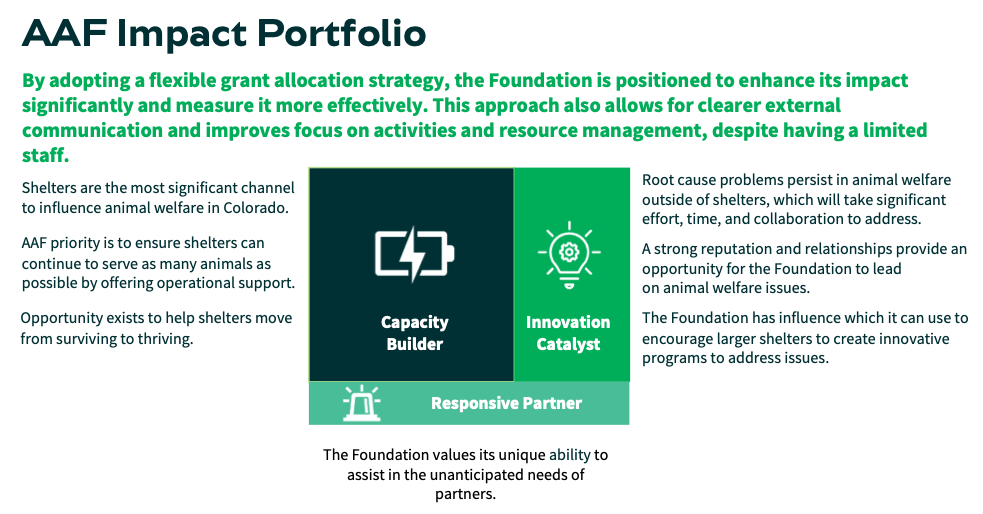Introduction
Nearly every funder faces the same dilemma: there’s never enough resources to meet all the needs in a chosen area of focus. But rare is the case when a funder is the sole source of support for an entire population. Such is the reality for the Animal Assistance Foundation (AAF), a 50-year-old foundation that is the only funder dedicated to animal welfare (cats, dogs, and horses) in the state of Colorado, a place that cherishes its companion animals. This burden has been compounded in recent times as communities have asked AAF to shoulder increasingly complex animal needs, without corresponding increases in funding. This would be a significant burden in normal times. Yet, animal welfare in Colorado, like much of the US, is facing unprecedented challenges following the COVID-19 pandemic.
This is the story of AAF’s strategic shift to demonstrate strategic leadership on multiple animal welfare concerns head-on through a six-month strategic planning process with Boldly Go Philanthropy.
opportunities to address the animal welfare crisis
Colorado’s animal shelters have seen substantial population growth following a significant increase in companion animal ownership during the pandemic. Over the 2021-2022 period, animal shelter intakes from strays increased by 18 % and owner relinquishments increased by 16 % in Colorado. Root causes to these trends include animal behavior issues (particularly amongst dogs), a profound veterinary shortage (with increasing costs of veterinary care), and inaccessible pet-inclusive housing. The length of stay for shelter and rescue pets — the time these animals spend at facilities before adoption or return to their owners — has increased during this period as well, which is particularly concerning to animal welfare organizations. This length of stay increases create additional burdens of cost, staff, and volunteer time, and more complex behavioral and veterinarian interventions for animals in care.
AAF is a leanly staffed foundation with two full-time staff, including the Executive Director. AAF grants approximately $1 – 1.5 million per year in line with its $30 million endowment. Like its grantees, the organization has been greatly challenged in the last several years. With a new Executive Director on board and with endorsement from the Board, AAF hired Boldly Go to help understand the state of the animal welfare field and work closely with the Board in identifying opportunities for greater focus and impact, leveraging the organization’s strong reputation as a collaborative partner in the state.
Boldly Go conducted interviews with companion animal leaders, reviewed animal shelter data trends, and facilitated conversations with numerous stakeholders and grantees to understand opportunities. Working with a Board Strategic Planning Steering Committee, Boldly Go proposed that AAF was uniquely positioned to build the capacity of animal shelters and lead on critical, root cause issues that require collaboration, research, and advocacy.
The Portfolio Concept: prioritizing limited resources
In the past, AAF had largely responded to the changing needs of animal shelters and several state-wide animal welfare nonprofits. Through its research and discussions with stakeholders, AAF settled on a three-prong strategic portfolio, leveraging its leadership position to tackle the multiple animal welfare needs in the state.

The portfolio’s three priorities each address a specific aspect of animal welfare in Colorado:
- Capacity Builder: By bolstering the operational capabilities and growth potential of animal shelters, this priority will be the backbone of AAF’s strategy. It recognizes that strengthening the operational, leadership, and strategic capability of shelters can create waves of positive change in the animal welfare landscape. This capacity building work will link organizations for knowledge sharing and mutual mentorship exchange.
- Innovation Catalyst: Here, the focus will be on facilitating dialogue, ideas, research, and action that can lead to solutions on intractable problems such as the veterinary shortage.
- Responsive Funder: The portfolio allows flexibility to act quickly in response to immediate and unforeseen challenges.
Conclusion
In addition to the strategic shift of its grantmaking, AAF moved its grantmaking recommendations from the Board to its professional staff, demonstrating new governance focused on strategy rather than individual grants. The organization’s collective leadership has a new strategic focus to help lead on the improved welfare of companion animals in Colorado. By having a flexible grant allocation focus, the Foundation will amplify its impact (and be able to measure it), improve its ability to communicate externally, and enhance its focus with limited staff.
Leave a Reply